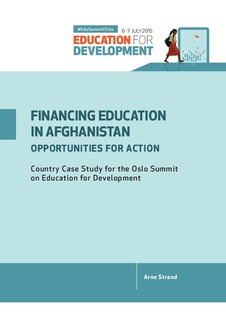Financing education in Afghanistan: Opportunities for action
Research report
Permanent lenke
http://hdl.handle.net/11250/2475321Utgivelsesdato
2015-01-01Metadata
Vis full innførselSamlinger
- Publications [1488]
Originalversjon
Education for developmentSammendrag
The Afghan Ministry of Education estimates that there are presently 8.35 million students (39% of which are girls) in primary, lower secondary, and upper secondary government schools, including Islamic schooling, out of a school-aged population of 10.33 million. However, 3.3 million children, the majority of which are girls, are still out of school. The share of the population that is 25 years or older and has completed any level of formal education is less than 7% for men and 3% for women. There are a number of opportunities for action in the education sector, particularly to increase education for girls and increase the quality of the education. Among the recommendations are to strengthen and develop teacher training, increase the number of qualified teachers, and assess if and how the NGOs and CBOs might take on a larger role. It is equally important to strengthen the MOE, specifically data and coordination efforts, to create mechanisms for competency-based hiring, improve the system for collecting and handling education data, and strengthen linkages and collaborations with other Ministries. The Government of Afghanistan and donors are advised to explore any possibility for more girls to attend and stay in school. The government is advised to communicate transparently with donors on achievements and challenges to gain and maintain trust. The Government of Afghanistan is recommended to build a domestic resources and support base, advocate the Afghan Parliament for the continued prioritization of funding for education in upcoming Afghan budgets, find ways to tap into private sector funds, and ensure a dialogue with local communities on their role in resource mobilization and support for education.
